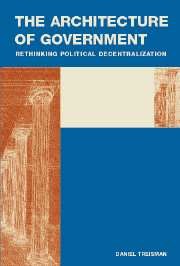Book contents
- Frontmatter
- Contents
- List of Figures and Tables
- Preface
- Glossary of Main Notation Used
- 1 INTRODUCTION
- 2 THE POLITICAL PROCESS
- 3 ADMINISTRATIVE EFFICIENCY
- 4 COMPETITION AMONG GOVERNMENTS
- 5 FISCAL POLICY AND REDISTRIBUTION
- 6 FISCAL COORDINATION AND INCENTIVES
- 7 CITIZENS AND GOVERNMENT
- 8 CHECKS, BALANCES, AND FREEDOM
- 9 ACQUIRING AND USING KNOWLEDGE
- 10 ETHNIC CONFLICT AND SECESSION
- 11 DATA TO THE RESCUE?
- 12 CONCLUSION: RETHINKING DECENTRALIZATION
- References
- Index
- Titles in the series
11 - DATA TO THE RESCUE?
Published online by Cambridge University Press: 05 June 2012
- Frontmatter
- Contents
- List of Figures and Tables
- Preface
- Glossary of Main Notation Used
- 1 INTRODUCTION
- 2 THE POLITICAL PROCESS
- 3 ADMINISTRATIVE EFFICIENCY
- 4 COMPETITION AMONG GOVERNMENTS
- 5 FISCAL POLICY AND REDISTRIBUTION
- 6 FISCAL COORDINATION AND INCENTIVES
- 7 CITIZENS AND GOVERNMENT
- 8 CHECKS, BALANCES, AND FREEDOM
- 9 ACQUIRING AND USING KNOWLEDGE
- 10 ETHNIC CONFLICT AND SECESSION
- 11 DATA TO THE RESCUE?
- 12 CONCLUSION: RETHINKING DECENTRALIZATION
- References
- Index
- Titles in the series
Summary
It is a capital mistake to theorize before one has data. Insensibly one begins to twist facts to suit theories, instead of theories to suit facts.
Sherlock Holmes, in Sir Arthur Conan Doyle's “Scandal in Bohemia” (1892)Facts are stupid things until brought into connection with some general law.
Louis Agassiz, in Scudder (1874)One response to the previous chapters might be to agree that theory is inconclusive and look to empirical research to determine whether the positive or negative effects of decentralization tend to dominate. “Where theory leaves us completely stranded,” advise Dahl and Tufte (1973, p. 44), “we can be rescued only by data.” It may not be possible to say in the abstract whether a decentralized constitution is better or worse than a more centralized one. But the proof of the pudding is in the eating.
There are several reasons why turning to empirical observations at this point might seem dangerous, if not perverse. First, even if we found the empirical “pudding” to be tasty, we would not know what it was we were consuming. If theory tells us not to expect a consistent relationship between decentralization and most political and economic outcomes, finding such a relationship in one data set gives us no reason to expect similar results in others. For instance, suppose one found a correlation between decentralization and individual liberty in a sample of countries.
- Type
- Chapter
- Information
- The Architecture of GovernmentRethinking Political Decentralization, pp. 247 - 269Publisher: Cambridge University PressPrint publication year: 2007

